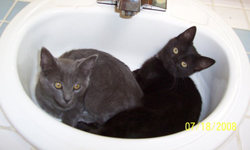
Kitten-proofing your home helps ensure your kitten’s safety as well as your own. Kittens are lively and curious, which can lead them into serious trouble unless you take preventative measures. Also, remember that a kitten has a lower vantage point than yours — like a baby who has begun to crawl — and may be attracted to things you do not see when you are standing. It’s practically impossible to absolutely kitten-proof your home against all accidents, but for your kitten’s safety here are some suggestions.
- Secure screens on all windows to help prevent falls, and keep your kitten off balconies, upper porches and high decks.
- Securely store cleaning supplies, laundry detergent, bleach, paint and paint thinner, pesticides, fertilizer, disinfectants, mothballs, poisons for roaches, ants and rats, medications, and antifreeze (which is deadly and very dangerous because kittens and cats are attracted to its sweet taste). Make sure you keep these in tightly closed areas so your kitten cannot gain access. Kittens are clever little creatures and can usually figure out how to open cabinets.
- Remove poisonous house plants, or place them in hanging baskets that you are sure will be completely out of your kitten’s reach. Some indoor and outdoor plants that are poisonous to cats include amaryllis, English Ivy, narcissus, dieffenbachia (dumb cane), mistletoe, poinsettia, holly, philodendron, azalea, rhododendron, daffodil, daphne, foxglove, bleeding heart, potato, iris, ivy, oleander, rubber plant, tobacco, tulip, clematis, morning glory, and weeping fig. Ask your veterinarian for a complete list of dangerous plants.
- Keep toilet lids down. Small kittens may fall in and drown. Bigger kittens or even adult cats may play in the water and the lid could close, injuring or trapping them; also, toilet bowl cleansers are harmful if swallowed.
- Store plastic bags where your kitten can’t get inside them and suffocate, or chew or tear them and swallow bits of plastic. If you let your kitten or cat play with any bag, even a paper grocery bag, be sure to cut the handles. A kitten or cat can get tangled in the handle of a bag and become frightened. In trying to free himself he could be seriously injured.
- Kittens can get tangled in the plastic six pack holders used for packaging beverages. Cut the holders apart to prevent this problem and also to protect wildlife that may accidentally encounter these holders.
- Keep exposed electrical cords as short as possible, or tack them against a baseboard so your kitten can’t play with them or chew on them. There are also tubular cord covers available at hardware stores to help protect your pets and hide unsightly electrical cords.
- Never give your kitten any medication without first consulting your veterinarian. Among the drugs dangerous to kittens are aspirin and the aspirin substitute acetaminophen, diet pills, sleeping pills and tranquilizers. Make sure these and any other medications labeled “keep out of reach of children” are kept out of reach of your kitten as well.
- Kittens love to explore and sleep in warm, dark places, so keep dresser drawers, trunks and closets closed. Check to see where your kitten is before closing the door of the refrigerator, dishwasher, trash compactor, oven, washer, or clothes dryer. Also, before leaving home, always conduct a “kitten check” to make sure that your kitten has not been accidentally locked in a closet or an empty room.
- Keep sewing supplies out of your kitten’s reach. Buttons, needles, pins, and thread can hurt your kitten’s mouth or internal organs if swallowed. The same goes for nails, staples, screws, beads and aluminum can tabs.
- Never leave a turned on stove unattended. Also, do not use electric blankets to line your kitten’s bed. He could be burned or even electrocuted if he chews on the wires.
- Use only safety collars made specifically for cats on your pet. They are designed to break if the kitty catches the collar on something. Collars not designed to break can strangle your kitty. Talk with your veterinarian about having your pets micro-chipped. Even if you are vigilant about keeping your pets indoors, accidents can happen. A fire, an earthquake, a careless visitor could be responsible for your pets getting outside and lost. If they are micro-chipped they can be easily identified and are far more likely to be returned to their owner.
- To avoid accidents, some cat toys should be used only when you are playing with your kitten. You should not give your kitten balls of string or yarn, spools of thread, rubber bands, balls of aluminum foil or cellophane, corks, or wire twist ties. Also, avoid anything with hard, sharp points that can break off. Be wary of toys that can break (Christmas tree ornaments for example), and be careful not to allow him to play with anything small enough to swallow — like buttons, beads or paper clips.
- Keep him away from children’s toys made of soft rubber, fur, wool, sponge, or polyurethane. If your kitten swallows a small particle of any of these materials, it could cause problems with his digestive system. Avoid all toys with squeakers, which might be swallowed.
- Keep your kitten or cat inside at all times. Remember the many dangers animals face when outdoors. Make his indoor world interesting with a variety of safe toys and give him plenty of loving attention. This could be a 20-year relationship. Enjoy each stage of his life.
These suggestions should help make your home a safe environment for your kitten.

